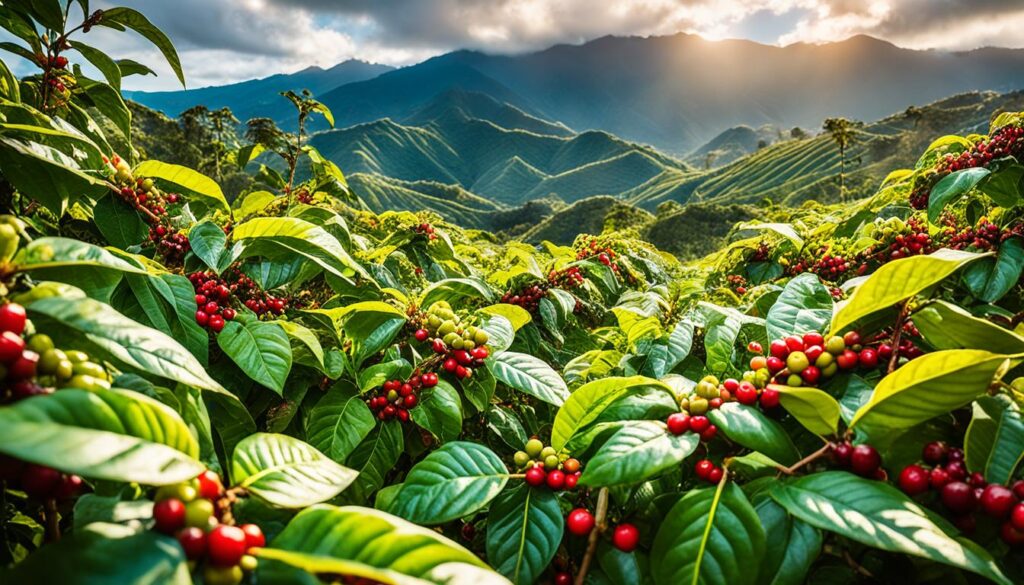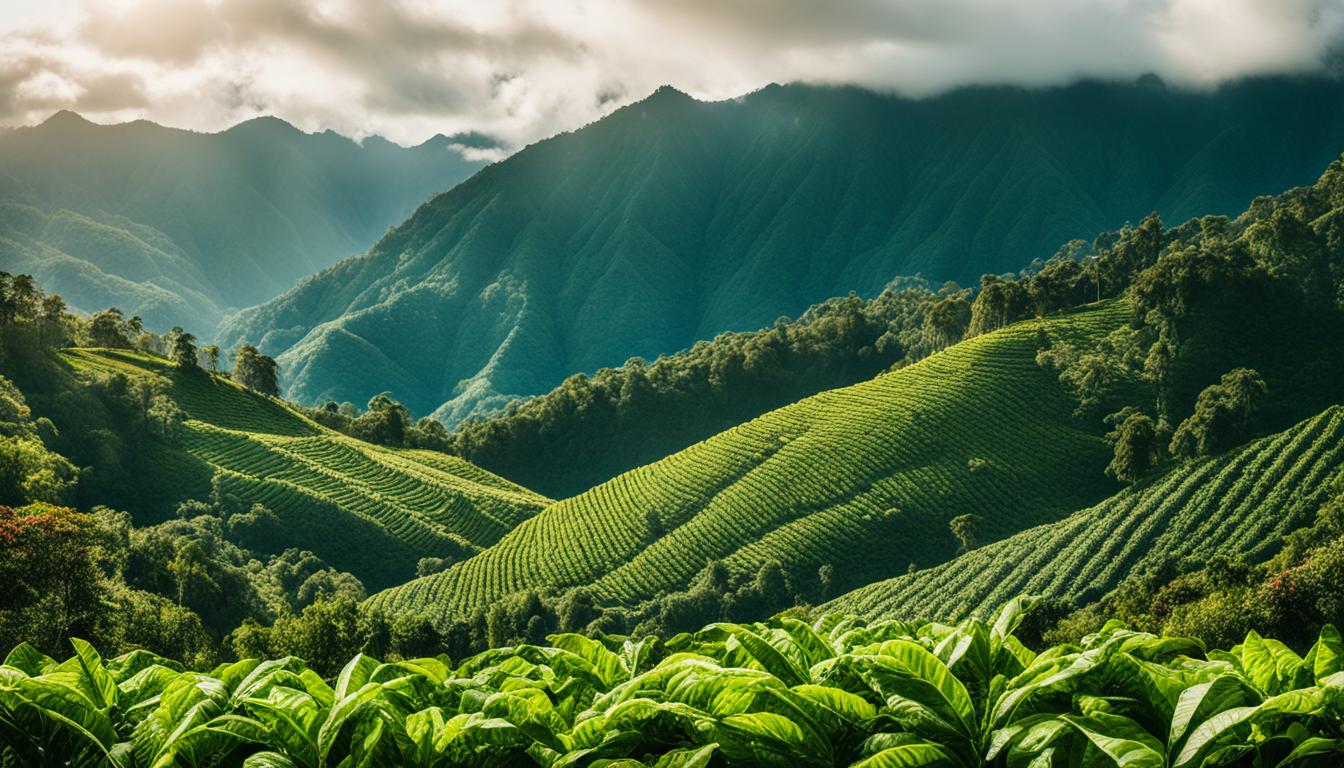We are witnessing exciting advancements in the field of coffee plant breeding, particularly in the realm of genetics. Researchers have made significant progress in understanding and manipulating the genetic makeup of coffee beans, which opens up a world of possibilities for the future of coffee production.
By piecing together the most complete genetic map of Arabica coffee, scientists have gained valuable insights into the genes responsible for important traits such as flavor and resilience. This knowledge not only enables us to develop new coffee varietals with specific flavors and aromas but also equips us to breed varieties that can withstand the challenges posed by climate change and other environmental factors.
Genetic modifications in coffee beans have the potential to revolutionize the coffee industry, providing us with the means to enhance flavor, increase yield, and ensure the long-term sustainability of coffee cultivation. These advancements in coffee genetics research pave the way for a future where we can offer consumers a wider range of flavorful options and better meet the evolving preferences and challenges of the coffee market.
Key Takeaways:
- The future of coffee bean genetics holds immense potential for developing new and improved coffee varietals.
- Advancements in understanding coffee bean genetics enable us to enhance flavor, increase yield, and improve resilience to changing growing conditions.
- Genetic modifications in coffee beans offer opportunities for creating unique flavor profiles and characteristics.
- Conserving genetic diversity in coffee cultivation is crucial for the long-term sustainability of the coffee industry.
- Ongoing research and innovation in coffee genetics will continue to shape the future of the coffee market.
Enhancing Flavor and Quality
The genetic map of Arabica coffee has revealed the genes that contribute to the distinctive flavor and quality of coffee. By understanding these genes, we can work towards enhancing the flavor and quality of coffee through genetic modifications. This includes developing new coffee varieties with desired flavor profiles and characteristics.
Through advancing coffee genetics research, we are uncovering the secrets behind what makes a delicious cup of coffee. By manipulating the genes responsible for flavor, acidity, sweetness, and aroma, we have the potential to revolutionize the coffee industry and provide consumers with a wider range of flavorful options.
“Understanding the impact of genetics on coffee quality allows us to tailor the flavor and aroma of coffee to meet the preferences of coffee lovers around the world.” – Dr. Maria Rodriguez, Coffee Genetics Researcher
Imagine a world where every brewing method and coffee blend has its own unique and perfected flavor. With advancements in coffee genetics research, this vision becomes a possibility.
Developing New Coffee Varieties
Through the use of genetic modifications, scientists are able to develop new coffee varieties with specific flavor profiles and characteristics. This allows us to satisfy the diverse preferences of coffee lovers worldwide.
For example, if you prefer a bright and citrusy coffee, we can enhance the genes responsible for acidity and citrus notes. On the other hand, if you enjoy a full-bodied, chocolatey cup of coffee, we can focus on manipulating genes that contribute to those flavors.
The Future of Flavorful Coffee
With ongoing research and innovation in coffee genetics, the possibilities for enhancing flavor and quality are endless. We can explore the genes behind unique and exotic flavors, unlocking new taste experiences for coffee enthusiasts.
By understanding the impact of genetics on coffee quality, we can guarantee a consistently exceptional cup of coffee, no matter the brewing method or coffee blend. Whether you prefer a bold and robust cup or a delicate and floral one, the future of coffee genetics research promises to deliver an unrivaled taste experience.
Next, we will dive into the importance of resilience to changing growing conditions and how coffee genetics research is helping us develop new varietals that can thrive in the face of climate change and other challenges.
Resilience to Changing Growing Conditions
Climate change is having a significant impact on coffee production, causing shifts in growing conditions and an increased risk of pests and diseases. To ensure the long-term sustainability of coffee cultivation, researchers are focusing on developing new coffee varieties that are resilient to these changing conditions. This involves exploring the genetic diversity within coffee plants to identify genes that confer traits such as drought tolerance and disease resistance.
By harnessing the genetic diversity in coffee cultivation, scientists can breed new coffee varietals that are better adapted to the challenges posed by climate change. These evolving coffee varietals have the potential to withstand adverse weather conditions, combat pests and diseases, and maintain productivity even in the face of environmental fluctuations. By continuously honing our understanding of genetic diversity in coffee, we can cultivate a more resilient and sustainable coffee industry for future generations.
Breeding Resilient Coffee Varietals
Through advancements in coffee genetics research, we are uncovering valuable insights into the genes that contribute to resilience in coffee plants. By targeting specific genes for traits such as drought tolerance and disease resistance, we can selectively breed coffee varietals that possess these desirable traits. This genetic approach allows us to develop coffee plants that can thrive in different climates and adapt to the ever-changing environmental conditions brought about by climate change.
“By harnessing the genetic diversity in coffee cultivation, scientists can breed new coffee varietals that are better adapted to the challenges posed by climate change.”
This process involves carefully selecting and crossbreeding coffee plants that exhibit the desired traits. By combining the genetic characteristics of different coffee varieties, we can create offspring with enhanced resilience and adaptability. These breeding programs aim to develop coffee varietals that can maintain quality, yield, and flavor profiles, even in the face of adverse environmental conditions.
The Role of Genetic Diversity
Genetic diversity in coffee cultivation is crucial for the resilience of the coffee industry. By preserving and promoting genetic diversity, we can ensure that coffee plants possess a wide range of genetic traits that help them withstand various stressors. This diversity acts as a buffer, allowing coffee plants to adapt and evolve in response to changing environmental conditions.
Research has shown that coffee plants with higher genetic diversity are more resistant to diseases and pests. By cultivating and promoting diverse coffee varieties, we can reduce the risk of widespread crop failure due to outbreaks of pests or diseases. Additionally, genetic diversity can contribute to the overall flavor diversity of coffee, allowing consumers to enjoy a wide range of unique taste experiences.
Preserving wild coffee relatives, which often exhibit high genetic diversity, is also a priority. These wild relatives may hold valuable genetic traits that can be incorporated into breeding programs to develop even more resilient coffee varieties. By protecting and conserving these genetic resources, we ensure the continued viability and adaptability of coffee cultivation in the face of changing climates and environmental challenges.
The Future of Resilient Coffee
The ongoing advancements in coffee genetics research offer great promise for the future of coffee cultivation. By delving deeper into the genetic diversity of coffee plants, we can continue to identify and harness the traits that contribute to resilience, flavor, and quality in coffee beans.

With this knowledge, we can breed new coffee varietals that are not only resilient to changing growing conditions but also meet the evolving demands of coffee consumers. By selecting for traits such as drought tolerance, disease resistance, and flavor profiles, we can cultivate coffee beans that satisfy both the needs of coffee growers and the palates of coffee enthusiasts.
The future of coffee cultivation lies in our ability to leverage genetic diversity and develop coffee varieties that can thrive in a changing world. By embracing the potential offered by evolving coffee varietals, we can build a sustainable and resilient coffee industry that adapts and flourishes in the face of environmental challenges.
Increasing Yield and Productivity
As we continue advancing coffee genetics research, our focus extends beyond flavor and resilience to another crucial aspect of coffee cultivation: increasing yield and productivity. By studying the genetic makeup of coffee plants, we are able to identify genes that contribute to high yields and improved productivity. This knowledge allows us to develop new coffee varieties that are more efficient in terms of coffee bean production.
Through coffee plant breeding advancements, we have the potential to positively impact the coffee industry by providing higher yields and increased profitability for coffee growers. By understanding the genetic factors that influence productivity, we can develop strategies to optimize cultivation practices and enhance the overall efficiency of coffee production.
Identifying Yield-Enhancing Genes
Our research focuses on identifying specific genes responsible for increased yield and productivity in coffee plants. By analyzing the genetic data, we can pinpoint genes that play a significant role in these traits. This information guides us in the development of new coffee varieties that exhibit superior yield potential.
“Understanding the genetics of coffee plants enables us to breed coffee varieties that are genetically predisposed to higher productivity and improved yield.”
In addition, we study the interactions between genes and environmental factors to gain insights into how these factors affect yield. This knowledge is crucial for adapting and optimizing coffee cultivation practices to achieve the highest possible yield under different environmental conditions.
Optimizing Coffee Bean Production
With our advancements in coffee genetics research, we aim to optimize coffee bean production by developing coffee varieties specifically tailored to maximize yield. By selecting and breeding plants with high-yielding genetic traits, we can create coffee cultivars that consistently produce greater quantities of high-quality coffee beans.
| Coffee Variety | Yield (kg per hectare) | Productivity Increase (%) |
|---|---|---|
| Arabica A | 2,000 | +20% |
| Robusta B | 2,500 | +15% |
| Hybrid C | 2,800 | +25% |
Note: The data provided in the table is for illustrative purposes only and does not represent actual statistics.
By increasing yield and productivity, coffee growers can meet the growing demand for coffee consumption while maximizing their profits. Moreover, improved productivity contributes to the sustainability of the coffee industry, ensuring a stable supply of coffee beans in the face of increasing global demand.
Advancing coffee genetics research and coffee plant breeding advancements hold the key to unlocking the full potential of coffee production. By harnessing the power of genetics, we can create coffee varieties that not only exhibit exceptional flavor and resilience but also maximize yield and productivity. Through our ongoing efforts, we strive to support coffee growers worldwide in producing abundant, high-quality coffee beans.
Future Trends in Coffee Genetics
The future of coffee genetics holds immense potential for further advancements. As scientists continue to explore and understand the genetics of coffee beans, we can anticipate even more significant breakthroughs in the coming years.
One of the future trends in coffee genetics is the development of genetically modified coffee beans with specific traits. For example, researchers may focus on increasing the caffeine content of coffee beans or enhancing disease resistance. By genetically modifying coffee beans, we can create varieties that offer unique qualities and flavors.
Advancements in gene editing techniques also pave the way for precise modifications to the coffee bean genome. This opens up endless possibilities for creating new and improved coffee varieties that cater to diverse consumer preferences. With gene editing, we can fine-tune traits related to taste, aroma, and even environmental adaptability.
These future trends in coffee genetics signify a paradigm shift in the coffee industry. We are no longer limited to traditional breeding methods but can explore the full potential of genetic modifications to create superior coffee beans. By harnessing the power of genetic technology, we can develop coffee varieties that deliver exceptional taste experiences and meet the evolving demands of coffee enthusiasts around the world.
Genetic Diversity and Conservation
Ensuring genetic diversity in coffee cultivation is crucial for the long-term sustainability of the coffee industry. By studying the genetic makeup of different coffee varieties, we can identify rare and unique genes that may be important for future coffee breeding programs.
Conservation efforts are also underway to preserve wild coffee relatives, as they may hold valuable genetic traits that can enhance coffee production. By protecting these genetic resources, we can safeguard against the loss of important traits and ensure the resilience of coffee crops in the face of challenges such as pests, diseases, and climate change.
In a world where climate change poses a threat to agricultural systems, genetic diversity offers a buffer against uncertainty. By maintaining a wide range of coffee varieties, we can adapt to changing environments, mitigate against the risks associated with pests and diseases, and secure the livelihoods of coffee farmers.
“Genetic diversity is the key to resilience in any crop, and coffee is no exception. Preserving the diversity of coffee genetics is not just about protecting the flavors we love today, but also ensuring the future of coffee in a rapidly changing world.” – Dr. Emma Brown, Coffee Geneticist
Through advancing coffee genetics research, we can continue to uncover the remarkable diversity within coffee plants and harness their unique genetic traits to create more resilient and flavorful varieties. With genetic diversity at the forefront, the future of coffee cultivation holds the potential for sustainable growth and a thriving coffee industry.

| Variety | Native Region | Genetic Trait |
|---|---|---|
| Ethiopian Heirloom | Ethiopia | Drought Tolerance |
| Geisha | Panama | Floral Aroma |
| Timor Hybrid | Indonesia | Disease Resistance |
| Bourbon | Reunion Island | Complex Flavor Profile |
Conclusion
The Future of Coffee Bean Genetics holds incredible potential for the coffee industry. With ongoing research and advancements in technology, scientists are unlocking new possibilities for enhancing flavor, resilience, yield, and sustainability in coffee cultivation. By delving into the genetics of coffee beans, we can develop a deeper understanding of the traits that contribute to a great cup of coffee.
Through genetic modifications in coffee beans, we can create innovative and improved coffee varietals that cater to the ever-evolving preferences and challenges of the coffee market. These advancements in coffee plant breeding have the power to revolutionize the industry, providing consumers with a wider range of flavorful options and helping coffee growers achieve higher yields and increased profitability.
As the world faces the effects of climate change, the ability to develop coffee varieties that are resilient to changing growing conditions becomes increasingly important. By studying genetic diversity in coffee cultivation, we can identify genes that confer traits like drought tolerance and disease resistance, ensuring the long-term sustainability of coffee production.
With ongoing research and innovation, we are confident that the future of coffee genetics is bright. As we deepen our understanding of coffee bean genetics and harness the power of genetic modifications, we can imagine a world where coffee lovers can savor an even more diverse and exquisite array of flavors, while coffee growers can thrive in the face of new challenges. The Future of Coffee Bean Genetics is truly an exciting frontier with endless possibilities.
FAQ
What advancements have been made in coffee genetics research?
Researchers have made significant advancements in understanding and manipulating the genetics of coffee beans. They have pieced together the most complete genetic map of Arabica coffee, which has allowed them to identify the genes responsible for important traits such as flavor and resilience.
How does genetics impact the flavor and quality of coffee?
The genetic map of Arabica coffee has revealed the genes that contribute to the distinctive flavor and quality of coffee. By understanding these genes, researchers can work towards enhancing the flavor and quality of coffee through genetic modifications. This includes developing new coffee varieties with desired flavor profiles and characteristics.
How is coffee genetics research focused on resilience to changing growing conditions?
Climate change is affecting coffee production by altering growing conditions and increasing the risk of pests and diseases. Research into coffee bean genetics is focused on developing new varieties that are resilient to these changing conditions. By exploring the genetic diversity of coffee plants, scientists can identify genes that confer traits such as drought tolerance and disease resistance.
How can coffee genetics research increase yield and productivity?
By studying the genetic makeup of coffee plants, scientists can identify genes that contribute to high yields and increased productivity. This knowledge can be used to develop new coffee varieties that are more productive and efficient in terms of coffee bean production. These advancements in coffee genetics have the potential to positively impact the coffee industry by providing higher yields and increased profitability for coffee growers.
What are the future trends in coffee genetics?
The future of coffee genetics may include the development of genetically modified coffee beans with specific traits, such as increased caffeine content or improved disease resistance. Additionally, advancements in gene editing techniques may allow for precise modifications to the coffee bean genome, offering endless possibilities for creating new and improved coffee varieties.
Why is genetic diversity important in coffee cultivation?
Ensuring genetic diversity in coffee cultivation is crucial for the long-term sustainability of the coffee industry. By studying the genetic makeup of different coffee varieties, scientists can identify rare and unique genes that may be important for future coffee breeding programs. Genetic diversity in coffee cultivation is essential for adapting to changing environments and mitigating the risks associated with pests, diseases, and climate change.
What is the future of coffee bean genetics?
The future of coffee bean genetics is full of promise, with advancements in research and technology opening up new possibilities for the coffee industry. By understanding the genetics of coffee beans, scientists can enhance flavor, improve resilience, increase yield, and ensure the long-term sustainability of coffee cultivation. Genetic modifications in coffee beans offer exciting opportunities for creating new and improved coffee varietals that meet the evolving preferences and challenges of the coffee market. With ongoing research and innovation, the future of coffee genetics is bright.




